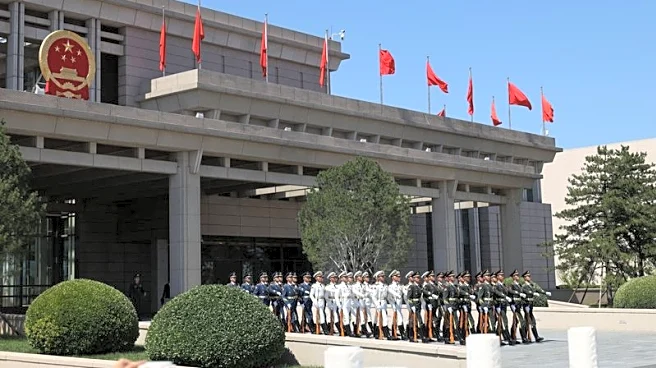(Reuters) -China commemorated 80 years since the end of World War Two this week with a massive military parade against a backdrop of a disputed history about who ultimately defeated Japan.
The issues, including
Japan's reckoning with its wartime record in China, are bound to flare again in December, a flashpoint anniversary of the mass killing in Nanjing by invading Japanese troops.
Below is an explainer about what the different - and disputed - points of view are.
WHAT IS CHINA'S VIEW?
For the Chinese government sitting in Beijing, this is a clear-cut issue: China sacrificed 35 million people in a heroic and brutal struggle against Japan that began in 1931 with the Japanese invasion of its northeastern region of Manchuria. Western countries, particularly the United States, have downplayed China's contribution.
China calls the conflict the Chinese People's War of Resistance against Japanese Aggression and, for World War Two, the World Anti-Fascist War.
It says China and the Soviet Union served as the "mainstay" of resistance against Japan and Germany, with communist guerrilla forces acting as the "backbone" of the fighting in China.
WHAT ABOUT TAIWAN?
Some of the most bitter comments about how China has marked the anniversary have come from Taiwan, whose formal name is the Republic of China. During World War Two the island itself was a Japanese colony.
During the war, the Republic of China was the country's government. Much of the fighting against Japan was done by their forces, who put a civil war on hold to form an uneasy alliance with Mao Zedong's communists.
It was the Republic of China, under Chiang Kai-shek, who signed the Japanese surrender along with the other allies, and the "Flying Tigers" of volunteer U.S. pilots flew for the Republic of China air force.
Taiwan's government says Mao's communists only used the war to strengthen their own forces, and that the Beijing government has no right to claim the victory as its own.
The civil war resumed after the end of World War Two. Chiang and his government fled to Taiwan in 1949 after Mao was victorious and proclaimed the People's Republic of China.
The de facto U.S. embassy in Taiwan this week highlighted the role of the "Flying Tigers" on its Facebook page. "Their sacrifices not only protected lives and liberty but also forged a bond of friendship and solidarity that lasts to this day," Raymond Greene, the top U.S. diplomat in Taiwan, wrote.
WHAT ROLE DID THE UNITED STATES PLAY?
Trump said after the parade that China's "beautiful ceremony" should have highlighted the role that the U.S. played in Japan's defeat.
The United States provided military aid and training to the Chinese forces.
One notable area of cooperation was "the Hump", where the U.S. Air Force flew hazardous missions over the eastern part of the Himalayas to supply China.
There were no American government representatives at the 80th anniversary event.
WHAT ABOUT JAPAN'S RESPONSIBILITY?
Japan's government has apologised for the suffering it caused in World War Two going back to 1995. Former Prime Minister Shinzo Abe angered China in 2015 by stopping short of a renewed apology, saying future generations of Japanese should not be "pre-destined to apologise."
Former Japanese Prime Minister Yukio Hatoyama attended the 80th anniversary event in Beijing this week and offered a personal apology, prompting criticism by some in Japan.
China's messaging this week focused more on its rise than Japan's wartime responsibility.
A gala in the Great Hall of the People attended by President Xi Jinping told the story of the war from 1937 to 1945 while avoiding any direct depiction of Japanese atrocities.
The performance depicted battles using the sound of offstage machine-gun fire that mowed down on-stage Chinese soldiers, some wearing light-blue uniforms historically associated with the Republic of China, rather than Mao's communists.
(Reporting by Ben Blanchard and Joe Cash; Editing by Saad Sayeed)










